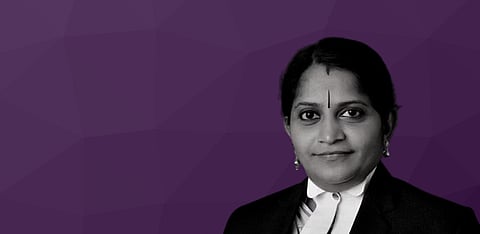

While the hearing was in progress, Gowri assumed office as additional judge of Madras High Court
—
ON Tuesday, the Supreme Court bench comprising Justices Sanjiv Khanna and B.R. Gavai dismissed petitions challenging the appointment of advocate and Bharatiya Janata Party (BJP) member Lekshmana Chandra Victoria Gowri as an additional judge of the Madras High Court on the grounds of her 'hate speeches' against the minority communities in the past. The bench observed that it was presumptive to think that the collegium did not have material information about Gowri while recommending her name.
Reportedly, on February 1, 2022, 22 advocates belonging to the Madras High Court Bar made representations to President Draupadi Murmu and the Supreme Court Collegium challenging Gowri's elevation.
On Monday, senior advocates Raju Ramachandran and Anand Grover mentioned the petitions to seek their urgent listing before a bench headed by CJI Dr. D.Y. Chandrachud and brought the notification appointing Gowri as a judge to the notice of the bench. After hearing Ramachandran and Grover briefly, CJI Dr. Chandrachud said that the Supreme Court Collegium had taken cognisance of the information that had come to its knowledge after it had recommended her name. The CJI added that he would list the matter for hearing on Tuesday before an appropriate bench.
During the hearing on Tuesday, Justice Khanna noted that the arguments must be based on "eligibility", instead of Gowri's "suitability" of being appointed as a judge. Contending on Gowri's eligibility, Ramachandran submitted that Article 217 of the Constitution, which deals with the appointment of a judge of the high court, has a threshold requirement. Ramachandran argued that since the fact of utterances of 'hate speech' on social media was not placed before the collegium, the decision-making process was compromised.
When the bench intervened to say that there had been instances when people from political backgrounds had been the judges, Ramachandran clarified that, in the present case, it was not Gowri's political affiliation that was being argued against but her speeches, which are ex- facie 'hate speeches' constituting it to be a "pure case of ineligibility". He emphasised that Gowri's appointment would be antithetical to principles under Articles 14, 15 and 21 of the Constitution. He added that the oath of office of the judge states that the judge should bear true faith in the Constitution but Gowri has rendered herself unfit for the same.
Justice Khanna, who was heading the bench, remarked that the collegium had taken into consideration all the aspects, adding that it would be presumptive to think that the material information was not within the knowledge of the collegium. However, Ramachandran countered it stating that the presumption that the collegium had knowledge was dislodged by the CJI's public statement in open court yesterday to the effect that the collegium was cognisant of the information brought to its notice after it recommended the name of Gowri. He highlighted that while the collegium recommended Gowri's appointment on January 17, the representation, once the facts became public, was made on February 1.
Justice Gavai joined Justice Khanna in adding that both the consultee judges (Justices V. Ramasubramnaium and M.M. Sundresh) must have also given their opinion on the antecedents and professional conduct of Gowri. "You have to trust the system", Justice Gavai said.
Further, when Justice Gavai pointed out that since Gowri will be appointed as an additional judge, her further elevation can still be challenged on grounds of misconduct, Ramachandran urged that, in light of the present facts before the bench, such a moment should not be awaited.
Senior advocate Anand Grover, on behalf of the petitioners, argued that the articles in which extreme views were authored by Gowri may not have been available to the collegium. He urged that if the consultative process is not fully informed, the eligibility of the appointment is affected, calling for a judicial review. Grover sought to submit that the collegium would have gone as per the inputs of the government.
"What the person says on Youtube or writes in the media may not have been available to the collegium. Judges (consultee judges) opine about antecedents in a professional capacity", Grover argued.
Justice Gavai retorted that the process originates from the high court. "Can we presume that senior high court judges were not aware of the antecedents?" he noted.
Senior advocate Manan Kumar Mishra, chairman of the Bar Council of India, interjected to say that there had been absolutely no complaints of misconduct against Gowri.
After hearing the arguments, the bench refused to allow the petitions. While the hearing was still in progress, Gowri took oath as additional judge of Madras High Court.